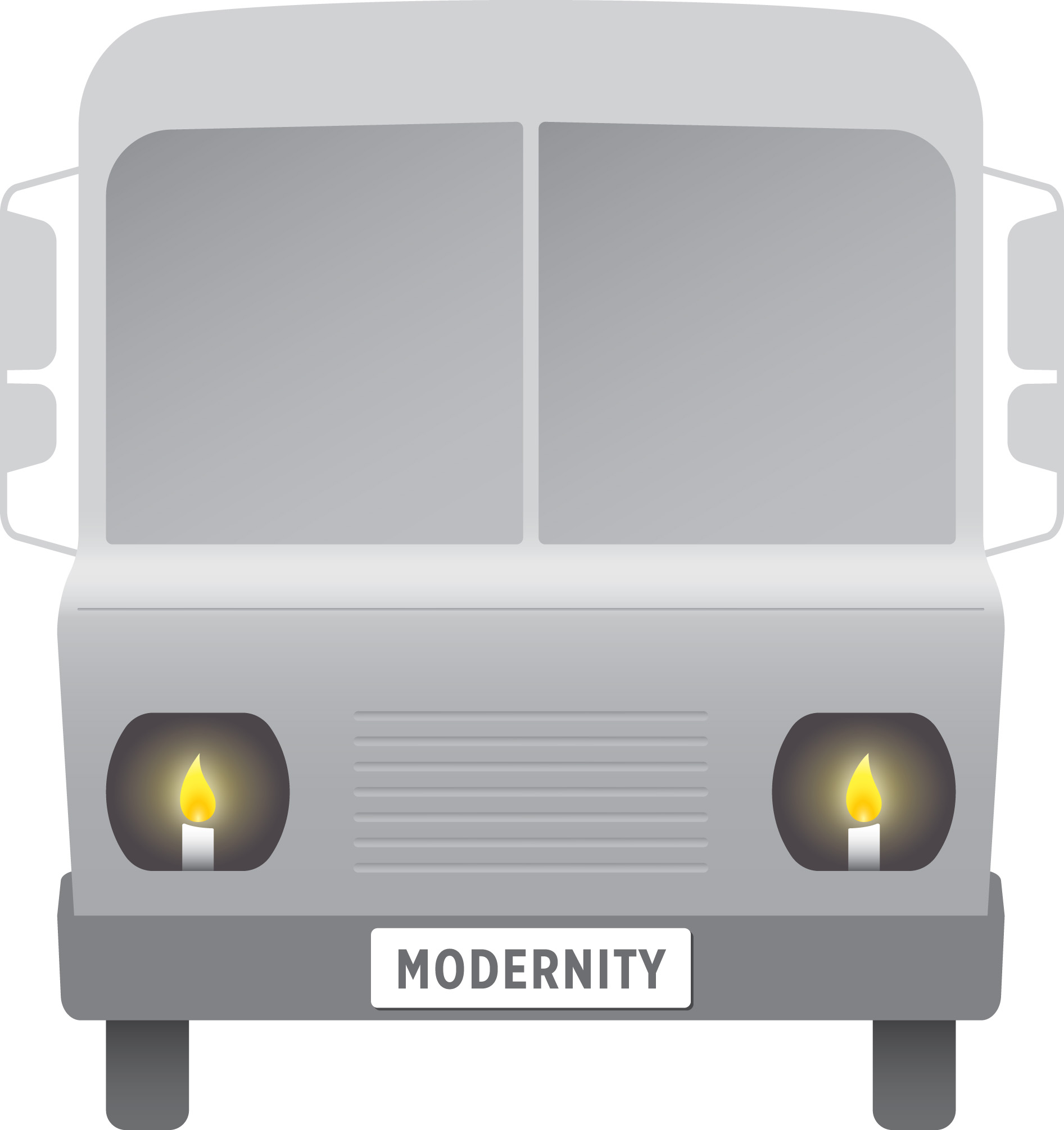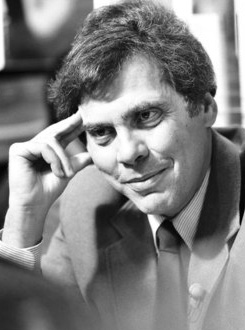Difference between revisions of "Holotopia"
m |
m |
||
| Line 4: | Line 4: | ||
<div class="col-md-3"><h3>Imagine...</h3></div> | <div class="col-md-3"><h3>Imagine...</h3></div> | ||
<div class="col-md-6"> | <div class="col-md-6"> | ||
| − | <p>You are about to board a bus for a long night ride, when you notice two flimsy, flickering streaks of light | + | <p>You are about to board a bus for a long night ride, when you notice two flimsy, flickering streaks of light emanating from two wax candles, placed in the circular holes where the headlights of bus are expected to be. Candles? As <em>headlights</em>? You rub your eyes in disbelief. What sort of nonsense is this? A weird joke? An art project?</p> |
| − | <p>Well of course, the idea of | + | <p>Well of course, the idea of candle headlights is so absurd that it is difficult even to imagine. So why are we talking about it? Because <em>on a much larger scale</em>, on the level of our society as a whole, where the things are so large that we cannot see them with naked eye—this absurdity has become reality.</p> |
</div> | </div> | ||
<div class="col-md-3"> | <div class="col-md-3"> | ||
| Line 44: | Line 44: | ||
<!-- | <!-- | ||
| − | |||
| − | |||
| − | |||
| − | |||
| − | |||
| − | |||
| − | |||
| − | |||
| − | |||
| − | |||
| − | |||
| − | |||
| − | |||
| − | |||
| − | |||
| − | |||
| − | |||
| − | |||
| − | |||
| − | |||
| − | |||
| − | |||
| − | |||
| − | |||
| − | |||
| − | |||
| − | |||
| − | |||
<div class="row"> | <div class="row"> | ||
| Line 259: | Line 231: | ||
<p><small>Thus the <em>holotopia</em> may be understood as an intervention into our contemporary condition, which empowers us to overcome the effects of renegade <em>socialization</em>, acquire new <em>gestalts</em>, and become able to change our <em>paradigm</em>. </small></p> | <p><small>Thus the <em>holotopia</em> may be understood as an intervention into our contemporary condition, which empowers us to overcome the effects of renegade <em>socialization</em>, acquire new <em>gestalts</em>, and become able to change our <em>paradigm</em>. </small></p> | ||
<p><small>Just as our ancestors did in Galilei's time. And so many times before then.</small> </p> | <p><small>Just as our ancestors did in Galilei's time. And so many times before then.</small> </p> | ||
| + | |||
| + | <!-- | ||
| + | |||
| + | |||
| + | |||
| + | <div class="row"> | ||
| + | <div class="col-md-3"><h3>We are tangled up in a paradox</h3></div> | ||
| + | <div class="col-md-7"> | ||
| + | [[File:Giddens-OS.jpeg]] | ||
| + | <p>The necessary change is blocked by the "ontological security" that the status quo provides.</p> | ||
| + | <p>As Anthony Giddens (the UK's premier sociologist and public intellectual) pointed out, we have learned to cope with the flood of information, the complexity of our world, and the general sense of meaninglessness (a natural consequence of riding into the future 'in a bus with candle headlights') by seeking meaning in another way: by performing successfully in "internally referential systems", notably in our careers. Would a successful football player want change the rules of his game, so that football may better serve the society?</p> | ||
| + | <p>Having been socialized to "mind our own business" and just <em>publish more</em>, as scientists or as journalists (because that's what we are paid to do, and what our careers depend on and our institutions require)—we have no incentive, no institutionalized methods, no will and even no <em>willpower</em> to make the kind of changes that would put information and knowledge into the service of <em>effective</em> meaning—<em>the kind of</em> meaning that our condition and the condition of our society now demand.</p> | ||
| + | <p>A goal of the Holotopia project, which is our next and current strategic task, is to overcome that obstacle.</p> | ||
| + | |||
| + | <p>The purpose of Holotopia is to not only <em>provide</em> answers—but to also empower us to <em>implement</em> the changes they are pointing to. </p> | ||
| + | </div> </div> | ||
| + | |||
| + | <div class="row"> | ||
| + | <div class="col-md-3"><h4>The objective of Holotopia is to help us change course</h4></div> | ||
| + | <div class="col-md-7"> | ||
| + | <p>A half-century ago, based on a decade of The Club of Rome's research into the future prospects of mankind, [[Holotopia: Aurelio Peccei|Aurelio Peccei]] (The Club's visionary co-founder and leader) diagnosed that the humanity is on a collision course with nature: | ||
| + | <blockquote> | ||
| + | It is absolutely essential to find a way to change course. | ||
| + | </blockquote> </p> | ||
| + | <p>Peccei also made it clear <em>in what way</em> the course needs to be changed:</p> | ||
| + | [[File:Peccei Revival.jpg]] | ||
| + | <p>He singled out "the human development", directed toward improving "the human quality", as "the most important goal". | ||
| + | </p> | ||
| + | <p> | ||
| + | We take Peccei's diagnosis as a challenge, and as a natural benchmark test for our project. Can the 'headlights' we are proposing help our society "find a way to change course"? And if they can—<em>what new course</em> would result?</p> | ||
| + | </div> </div> | ||
Revision as of 16:41, 31 March 2020
Holotopia
Imagine...
You are about to board a bus for a long night ride, when you notice two flimsy, flickering streaks of light emanating from two wax candles, placed in the circular holes where the headlights of bus are expected to be. Candles? As headlights? You rub your eyes in disbelief. What sort of nonsense is this? A weird joke? An art project?
Well of course, the idea of candle headlights is so absurd that it is difficult even to imagine. So why are we talking about it? Because on a much larger scale, on the level of our society as a whole, where the things are so large that we cannot see them with naked eye—this absurdity has become reality.
Our proposal
The crux of our knowledge federation proposal is to change the relationship we (as culture, and as people) have with information; and with knowledge. And by doing that, change the relationship we have with the world; and with ourselves.
What is the relationship we have with information presently like? Well, there hardly is any. As Neil Postman observed,
"The tie between information and action has been severed. Information is now a commodity that can be bought and sold, or used as a form of entertainment, or worn like a garment to enhance one's status. It comes indiscriminately, directed at no one in particular, disconnected from usefulness; we are glutted with information, drowning in information, have no control over it, don't know what to do with it."
Seeing things whole
So suppose this absurd situation ended, and we handled information as we handle other human-made thing—by suiting it to the purposes that need to be served. What would our information be like? By what methods, in what ways and by whom would it be created? How would information be used? What new information formats, what new kinds of information would emerge? How would the information technology be adapted and applied? In what way would our public informing be different? Or academic communication, or education?
The substance of our knowledge federation proposal is a complete and academically coherent answer to those and other related questions; answers that are not only described and explained, but also implemented—as a collection of real-life embedded prototypes.
We here refer to the proposed approach to knowledge by its pseudonym holoscope, to highlight one of its distinguishing characteristic: It helps us see things whole.
 Every whole has sides that are obvious, and sides that are hidden. A purpose of the holoscope is to illuminate what has remained obscure, so that we may correctly see our object of interest's shape and proportions.
Every whole has sides that are obvious, and sides that are hidden. A purpose of the holoscope is to illuminate what has remained obscure, so that we may correctly see our object of interest's shape and proportions.
If we should make things whole, we must first see them whole. And that's, of course, where the holoscope comes in.
The holoscope complements the approach of the sciences:
Science gave us new ways to look at the world, and our vision expanded beyond bounds. The telescope and the microscope enabled us to see the things that were too distant or too small to be seen by the naked eye. At the same time, science had the tendency to keep us focused on things that were either too distant or too small to be relevant – compared to all those big things nearby, which now demand our attention. The holoscope is conceived as a way to look at the world that helps us see any chosen thing or theme as a whole – from all sides; and in correct proportions.


